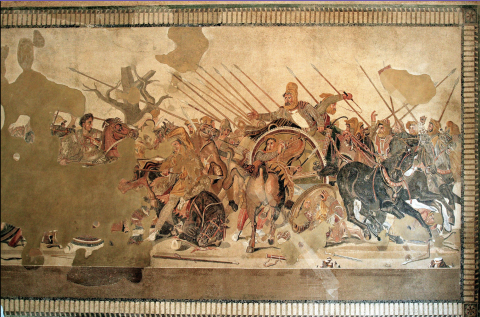Jordan Mitchell
October 3, 2023
As a classicist who focuses on Roman literature, it should come as no surprise that I think about the Romans a lot, every day, in fact. And now I know that I am not alone. A recent trend on TikTok where women ask men how often they think about the Roman Empire has gone viral. The vast majority of men respond that they think about the Roman Empire a great deal, with many saying several times a week. This seemingly pervasive response comes as a surprise to the women asking, followed by an inevitable, “Why?” Why indeed are so many men thinking about the Roman Empire all the time? I mean, what have the Romans ever done for us? (I couldn’t resist).
Classicists Sarah E. Bond and Stephanie Wong addressed this trend in an opinion piece for MSNBC, arguing that this phenomenon is a manifestation of a toxic masculinity — that, through the Romans, modern men idolize violence and the picture themselves as conquerors. Bond and Wong cite Elon Musk as an example of a man who has valorized particularly toxic aspects of Roman history. To go along with Elon Musk, there is also Jordan Peterson, who has appropriated the Romans, ancient history, ancient mythology, and Biblical scripture in his push to “strengthen” modern masculinity in a campaign against “wokeness”. There has also been a recent surge in the popularity of de-contextualized and surface-level stoicism through the publishing of self-help books by Ryan Holiday, the author of the Daily Stoic.
There seems to be a trend in thinking among a segment of men in which they imagine themselves as the inheritors of an ancient wisdom that was somehow lost because of modern culture. Bond and Wong combat this in their article by drawing attention to the realities of a Roman existence: when modern men imagine themselves as conquering centurions, victorious gladiators, or philosopher kings, they do not realize that most people who lived during the Roman Empire were simple farmers, the urban poor, freedpersons, or enslaved. Knowing the reality, however, does not guarantee any sort of realization.
Like Bond and Wong, as someone who researches aspects of ancient gender and sexuality myself, when I first heard about this trend, it was my assumption that most of these men think about the Roman Empire in the same way that a large number of modern men think about WWII: as the glorification of an idealized, militaristic hyper-masculinity that exists as a form of modern reception far more than in reality. This iteration of rhetoric sees the Roman Empire as the pinnacle of civilization in the same way that a lot of men seem to think about Sparta and its warrior class — a myth that scholars and students alike have spilt ink debunking.
While watching the TikTok videos themselves, my initial assumptions were confirmed in more than a few explanation videos. Men claim that the reason they think about the Romans so often is because men have an inherent need to conquer, and the Romans embodied this natural characteristic. One explanation video claims, moreover, that Roman men practiced traditional virtues that are no longer in existence today, and that, instead, our modern age only possesses Roman vices.
Both these lines of thought strike me as variations on the theme of imagining a non-existent past that men should be attempting to create in the present: “Make modern masculinity Roman again.” I think it would come as a surprise to these men that even the most valorized form of Roman masculinity, the one that elite Roman men emphasized in their writing, would not cohere with their modern conception of an ideal masculinity. Roman ideas concerning masculinity always seemed to be threatened — one could easily point to Catullus 16 to emphasize the fragility of Roman masculinity — or in a state of crisis, even when those ideas were more or less constant within a particular period. This is because Roman masculinity was highly performative, defined by iterative public actions, not by a steadfast inherent nature. A good recent book on this is Melanie Racette-Campbell’s The Crisis of Masculinity in the Age of Augustus.
I am aware that this trend is meant to be lighthearted and not harmful in itself. On the one hand, it does show how deeply saturated Roman history is in our cultural mindset, which you might think should be good news for classicists.
But why it is so distinctly gendered? Why is the question “How often do men think about the Roman Empire”? The gendered targeting of the question appears to reinforce the idea that Roman history, if not history in general, is distinctly male-coded. The TikTok trend does reinforce the traditional notion that history is the purview of men, but that is certainly not the case.
One post by a woman on Tumblr emphasized that she, too, loves the Roman Empire: “‘Men think about the Roman Empire’ ‘What’s the female version of the Roman Empire’ SHUT UPPPPP. SHUT THE FUCK UPPPPPP. AS A WOMAN I LOVE THE ROMAN EMPIRE.” I have seen similar, less emphatically rendered, statements made by other women who affirm that they also frequently think about the Roman Empire, in the comments of the most viewed video on TikTok. The trend has already quickly progressed to people posting #thisismyRomanEmpire, followed by an endless variety of media.
The takeaway from all this, though, seems to be that it is far more acceptable for men to be up front about thinking about the Roman Empire all the time than it is for women, even though many women also think about it. Also, some men think about it more often than others in ways that in no way reflect the lived reality of the Romans themselves — only serving to reinforce toxic aspects of modern masculinity. While others, well, they just think the Romans were pretty neat!
Header image: The Alexander Mosaic, c. 100 BCE, Pompeii
Authors


